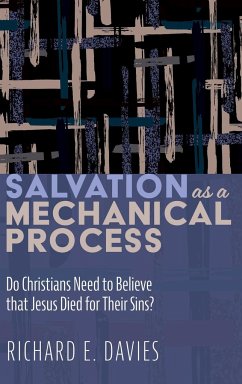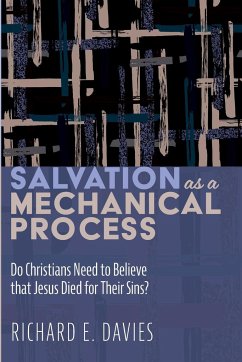
Salvation As a Mechanical Process
Versandkostenfrei!
Versandfertig in 1-2 Wochen
38,99 €
inkl. MwSt.
Weitere Ausgaben:

PAYBACK Punkte
19 °P sammeln!
Christians have been taught that Jesus died on the cross to pay a fine or ransom to expiate or atone for our sins. Furthermore, they have been taught that the death of Jesus is the only way individuals can receive eternal salvation. In general, this notion is called the ""doctrine of blood atonement"" or ""penal substitution,"" or some similar name. One reason for this teaching is that the development of Newtonian mechanics has led us to believe that God's ""laws of salvation"" must be as easy to understand as the seventeenth- and eighteenth-century ""laws"" of our physical world. This book de...
Christians have been taught that Jesus died on the cross to pay a fine or ransom to expiate or atone for our sins. Furthermore, they have been taught that the death of Jesus is the only way individuals can receive eternal salvation. In general, this notion is called the ""doctrine of blood atonement"" or ""penal substitution,"" or some similar name. One reason for this teaching is that the development of Newtonian mechanics has led us to believe that God's ""laws of salvation"" must be as easy to understand as the seventeenth- and eighteenth-century ""laws"" of our physical world. This book demonstrates that there are alternatives for understanding Jesus' execution that are consistent with the twentieth- and twenty-first-century understanding of our physical world. In fact, the early Christian writers (including the Bible itself) described these alternatives. ""Sacrifice"" was only one form of the early Christian narrative explaining the death of Jesus. Although ""blood atonement"" was understandable in ancient Roman culture, it is not understandable in our culture. The inevitable conclusion is that we should abandon ""blood atonement"" and develop one of the alternative ways of understanding the cosmic significance of Jesus' execution.













